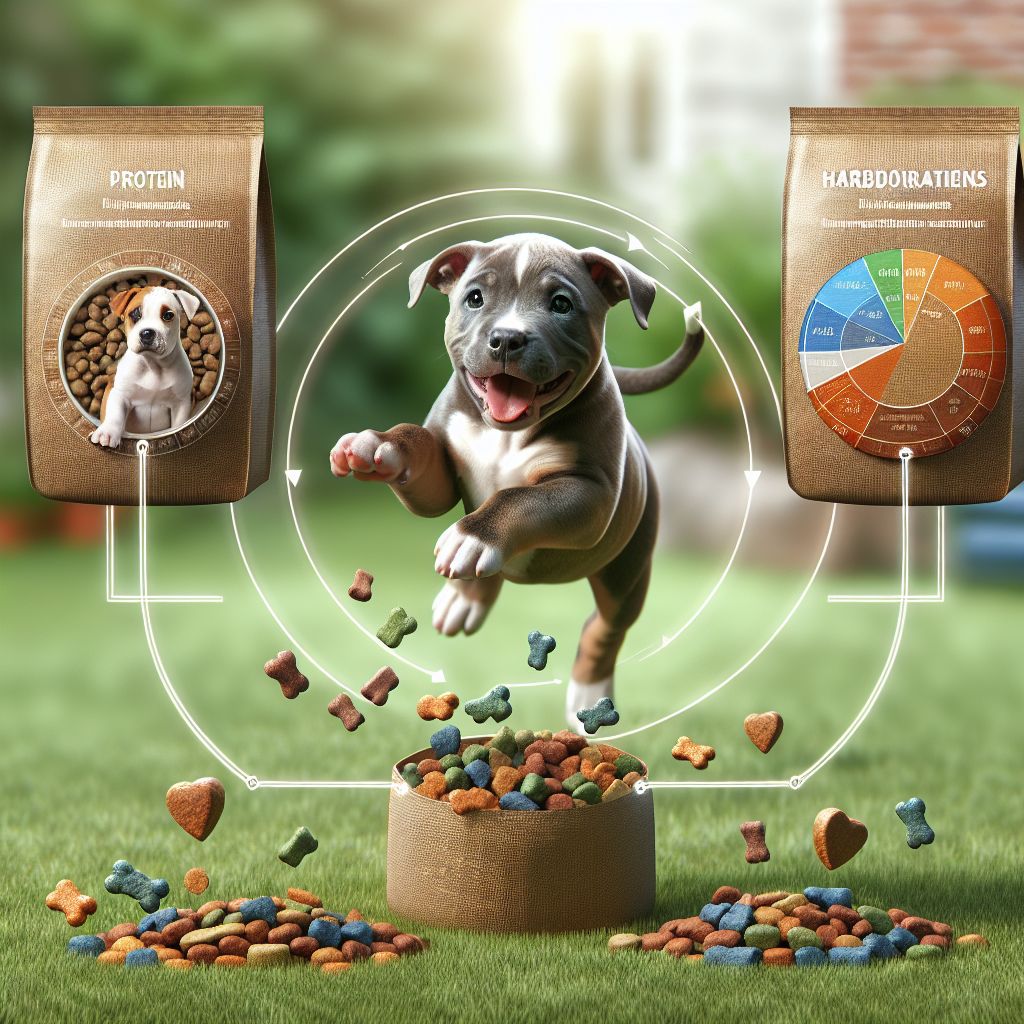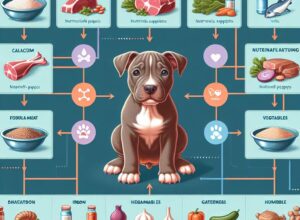
Key Takeaways
- Pitbull puppies require a diet rich in proteins, fats, and carbohydrates for balanced growth.
- Look for dog food with real meat as the first ingredient, and avoid those with fillers like corn and wheat.
- Understand the significance of AAFCO guidelines to ensure the food meets your puppy’s nutritional needs.
- Feed your Pitbull puppy multiple small meals a day, adjusting portions as they grow.
- Always consult with a veterinarian before making any significant changes to your puppy’s diet.
Fueling Your Pitbull Puppy’s Growth: A Guide to Optimal Nutrition
When you bring a Pitbull puppy into your life, you’re not just getting a new furry friend; you’re taking on the responsibility of ensuring they grow up strong and healthy. And a huge part of that is providing them with the right nutrition. Let’s dive into what makes a puppy’s diet different from an adult dog’s and how you can make sure your Pitbull pup is getting all the nutrients they need.
Understanding Your Pitbull Puppy’s Nutritional Needs
First things first, puppies have different nutritional requirements than adult dogs. They need more calories, protein, and certain vitamins and minerals to support their rapid growth and development. For your Pitbull puppy, this means finding a food that’s specifically designed for puppies, particularly large breed puppies, which tend to grow at a fast pace. Besides that, you’ll want to make sure the food you choose adheres to the Association of American Feed Control Officials (AAFCO) guidelines, which will ensure it’s complete and balanced.
Key Nutrients for Robust Health and Development
A Pitbull puppy’s diet should be rich in:
- Proteins: Look for dog food that lists real meat as the first ingredient. High-quality animal proteins like chicken, beef, fish, or lamb are crucial for your puppy’s muscle development.
- Fats: Essential fatty acids, especially omega-3 and omega-6, support brain development, provide energy, and keep your puppy’s coat shiny. Good sources include fish oil and flaxseed.
- Carbohydrates: While carbs are necessary for energy, they should come from wholesome sources like brown rice or sweet potatoes, rather than fillers like corn or wheat.
Most importantly, the balance of these nutrients is key. Too much of one can throw off the harmony your puppy’s body needs to thrive. Therefore, it’s critical to read the labels and understand what’s going into your Pitbull’s growing body.
Deciphering Dog Food Labels
Reading dog food labels can feel like trying to understand a foreign language. But once you know what to look for, it becomes much easier to find quality food that will support your puppy’s health. The first ingredient should always be a high-quality protein source. This indicates the food is more likely to have the nutrients your puppy needs.
Ingredients are listed by weight, so those at the top of the list are present in higher quantities. You want to see whole foods listed before any by-products or fillers. That’s because whole foods provide more natural nutrients that are easier for your puppy to digest.
Here’s a quick example of what to look for:
Real chicken, chicken meal, brown rice, sweet potatoes, and peas… Good!
Ground yellow corn, chicken by-product meal, wheat, soybean meal… Not so good!
And don’t forget to look for the AAFCO statement, usually found on the back or side of the bag. This will tell you if the food is formulated to meet the nutritional levels established by the AAFCO Dog Food Nutrient Profiles for Growth.
Besides that, it’s also crucial to avoid foods with artificial colors, flavors, or preservatives like BHA, BHT, and ethoxyquin, which can be harmful to your puppy’s health.
Stay tuned for the next section, where we’ll delve deeper into the macronutrients your Pitbull puppy needs and how to choose the right food brand.
Measuring Macronutrients: Proteins, Fats, and Carbohydrates
When it comes to feeding your Pitbull puppy, it’s not just about how much they eat, but what they eat. Macronutrients are the cornerstone of any nutritious diet, and for growing puppies, getting the right balance is even more crucial.
Essential Proteins for Muscle and Tissue Growth
Proteins are the building blocks of your puppy’s body. They play a vital role in developing muscles, repairing tissues, and supporting a healthy immune system. A diet lacking in high-quality protein can lead to stunted growth and a weakened immune system. For Pitbull puppies, who are known for their muscular build, protein is particularly important. Aim for dog foods where meats like chicken, lamb, or fish are listed as the first ingredient to ensure your pup is getting the protein they need.
The Role of Fats in Energy and Cell Function
Fats are more than just a source of energy; they’re essential for the absorption of vitamins and for supporting cell growth. They also play a role in keeping your puppy’s skin and coat healthy. Look for foods that include sources of good fats like chicken fat, fish oil, or flaxseed. Remember, though, that too much fat can lead to obesity, so it’s important to find a balanced food.
Carbohydrates: Energy Source or Excess?
Carbohydrates provide a quick source of energy, which is especially important for active puppies. However, not all carbs are created equal. Whole grains like brown rice or barley are preferable over fillers like corn or wheat, which can be harder for your puppy to digest and offer less nutritional value. The right carbohydrates can also provide fiber, which helps with digestion.
Choosing the Right Puppy Food Brand
With so many options on the market, choosing the right food for your Pitbull puppy can be overwhelming. But with a little knowledge and understanding of what to look for, you can make an informed decision that will benefit your puppy’s health. For more guidance, read our comparison guide on homemade vs store-bought food for Pitbull puppies.
Comparing Top Recommendations for Pitbull Puppies
When comparing brands, consider the following factors: grain-free diets for pitbull puppies and their pros and cons, the importance of omega-3 fatty acids, and the risks and benefits of a high-fiber diet.
- Does the food meet AAFCO standards for puppy growth?
- Are real meats listed as the first few ingredients?
- Are there any unnecessary fillers or artificial additives?
- What do the reviews say about the food’s quality and the company’s reputation?
Some top brands that often meet these criteria include Blue Buffalo, Wellness CORE, and Orijen. Each of these brands offers puppy-specific formulas that provide the nutrients your Pitbull needs to grow up healthy and strong.
Navigating Product Reviews and Expert Opinions
While reviews can be helpful, it’s important to take them with a grain of salt. Look for patterns in reviews rather than relying on a single opinion. Additionally, expert opinions, such as those from your vet or a pet nutritionist, can provide valuable insight into which food might be best for your puppy’s specific needs.
Portion Control and Feeding Frequency
Feeding your Pitbull puppy the right amount of food is just as important as feeding them the right kind of food. Overfeeding can lead to obesity while underfeeding can hinder their growth.
Determining the Right Amount of Food
The amount of food your puppy needs depends on their age, size, and activity level. Most dog food brands provide a feeding chart based on your puppy’s weight. It’s a good starting point, but remember, these are just guidelines. You might need to adjust the portions based on your puppy’s individual needs.
Scheduling Meals for Optimum Growth
Pitbull puppies do best with multiple small meals throughout the day. Feeding them three to four times a day can help maintain their energy levels and support their fast-growing bodies. As they grow older, you can gradually reduce the number of meals to two times a day.
Customizing Your Puppy’s Diet
Just like people, every puppy is unique. Some might have specific health needs or dietary restrictions that require a customized diet plan.
If your puppy has a sensitive stomach, for instance, you might need to find a formula that is free from certain ingredients like grains or specific proteins. And if your puppy is a picky eater, you might need to experiment with different flavors or textures to find what they like.
Mixing kibble with wet food can sometimes make meals more appealing to puppies and can also provide them with some extra hydration. But before making any significant changes to your puppy’s diet, it’s always best to consult with your vet to ensure you’re meeting their nutritional needs without causing any digestive upset.
By taking the time to understand the nutritional needs of your Pitbull puppy and choosing the right food, you’re setting them up for a healthy, happy life. Remember, the effort you put into their diet now will pay off with years of joy and companionship in the future.
Every Pitbull puppy is a unique individual, with its own preferences and nutritional needs. This becomes especially important if your pup has health issues or allergies that require a special diet. As responsible pet parents, we must be attentive and ready to adapt our approach to meet these specific needs.
Considering Specific Health Needs or Restrictions
If your Pitbull puppy has specific health concerns, like a sensitive stomach or skin allergies, you’ll need to choose a diet that caters to these issues. Hypoallergenic or limited-ingredient diets can be beneficial for puppies with allergies. These diets often use novel protein sources like venison or duck that your pup may not have been exposed to, reducing the risk of an allergic reaction.
Mixing Kibble with Wet Food or Raw Diets
Mixing dry kibble with wet food or incorporating a raw diet can offer variety and extra nutrition. Wet food can be more palatable and easier to digest for some puppies, while raw diets can provide natural enzymes and nutrients. However, it’s crucial to ensure that any diet change is complete and balanced. Consulting with a vet or a pet nutritionist can help you make the best choice for your Pitbull puppy’s diet.
FAQs
As a pet parent, you’re bound to have questions about your Pitbull puppy’s diet. Let’s address some of the most common queries. For detailed information on what to look for in your dog’s food, you can learn how to read a dog food label from the American Kennel Club.
How Often Should I Feed My Pitbull Puppy?
Pitbull puppies have small stomachs and high energy needs, so they should be fed three to four times a day. As they grow, you can reduce feeding to twice daily. Always ensure fresh water is available, and remember, consistency is key to helping your puppy establish a healthy eating routine.
What Are the Signs of Dietary Deficiencies in Puppies?
Signs of dietary deficiencies may include lackluster coat, lethargy, stunted growth, or digestive issues. If you notice any of these symptoms, it’s essential to consult your veterinarian. They can help identify the deficiency and recommend dietary adjustments or supplements to get your pup back on track.
Can I Give My Puppy Adult Dog Food?
Adult dog food lacks the essential nutrients needed for a growing puppy and can lead to developmental problems. Stick with puppy-formulated food until your Pitbull reaches maturity, around 12 to 18 months of age, before transitioning to adult food.
What Should I Do If My Puppy Is Allergic to Certain Foods?
If you suspect your Pitbull puppy has a food allergy, consult with your vet. They may suggest an elimination diet to pinpoint the offending ingredient. Once identified, you’ll need to find a dog food that doesn’t contain that ingredient or opt for a hypoallergenic diet.
Is Grain-Free Food Better for My Pitbull Puppy?
Grain-free diets have become popular, but they aren’t necessarily better for every puppy. Some puppies may require grain-free food due to allergies or sensitivities, but many do well with grains in their diet. Always choose a food based on your puppy’s individual health and nutritional needs, not just trends.
- Feed your Pitbull puppy three to four times a day with puppy-formulated food.
- Monitor your puppy for signs of dietary deficiencies and consult a vet if concerns arise.
- Transition to adult dog food when your puppy reaches maturity, around 12 to 18 months.
- For food allergies, work with your vet to identify and eliminate the problematic ingredient.
- Choose a grain-free diet if necessary, but remember that grains can be a healthy part of many puppies’ diets.
Providing your Pitbull puppy with the right nutrition is a vital part of ensuring they grow into a healthy and happy adult dog. By understanding the nutritional content of their food, considering their individual health needs, and staying informed through trusted sources, you’ll be well on your way to raising a strong and vibrant Pitbull companion. Remember, when in doubt, your vet is an invaluable resource for personalized advice tailored to your puppy’s unique needs.
So, there you have it—your comprehensive guide to Pitbull puppy nutrition. By following these tips and keeping your vet in the loop, you’ll be doing everything you can to support your pup’s growth and well-being. Here’s to a long, healthy, and joyful life with your four-legged friend!
And remember, the journey of raising a puppy is as much about love and bonding as it is about providing the right care. So, enjoy every moment with your Pitbull puppy, and let your love and care – along with the right diet – lead the way to a fulfilling life together. Cheers to the adventures and the meals you’ll share along the way!



